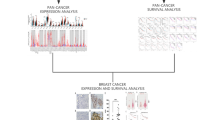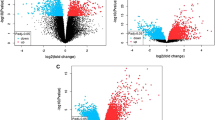Abstract
Increasing evidence has demonstrated that enhanced PHF20 expression plays a crucial role in cancer development and progression. However, little is known about the prognostic value of PHF20 expression in breast cancer (BRCA). In this study, we attempted to explore the expression pattern of PHF20 and its associations with prognosis and immune status in BRCA. The gene expression data and clinical information of 1109 BRCA samples were downloaded from TCGA database. The expression level of PHF20 protein was determined using UALCAN and HPA database. Kaplan–Meier method and CIBERSORT algorithm were used to analyze the associations of PHF20 expression with overall survival (OS) and immune microenvironment, respectively. Besides, GSEA analysis was conducted to explore potential biological functions and molecular mechanisms of PHF20 in BRCA. Moreover, starBase database was applied to construct a ceRNA nework. PHF20 was highly expressed in BRCA samples both at the transcriptional and protein level, and was strongly correlated with the OS and immune status. Univariable and multivariate Cox regression analyses identified PHF20 as an independent prognostic factor. Additionally, GSEA analysis showed that high PHF20 expression was closely associated with TGF-β signaling pathway, Wnt signaling pathway, and adherens junction. Furthermore, three ceRNA networks (AC037198.1/hsa-miR-223-3p/PHF20, CBR3-AS1/hsa-miR-223-3p/PHF20, and ZNF561-AS1/hsa-miR-223-3p/PHF20) were identified by starBase analysis. Functional experiments validated that PHF20 knockdown inhibited the cell viability and progression in BRCA cells. PHF20 overexpression was significantly associated with poor prognosis and immune status in BRCA, and could act as a potential novel prognostic biomarker for BRCA.








Similar content being viewed by others
Data Availability
All datasets used and analyzed in the current study are available from the public TCGA, UALCAN, and HPA database.
References
Ali HR, Chlon L, Pharoah PD, Markowetz F, Caldas C (2016) Patterns of immune infiltration in breast cancer and their clinical implications: a gene-expression-based retrospective study. PLoS Med 13(12):e1002194. https://doi.org/10.1371/journal.pmed.1002194
Burugu S, Asleh-Aburaya K, Nielsen TO (2017) Immune infiltrates in the breast cancer microenvironment: detection, characterization and clinical implication. Breast Cancer 24(1):3–15. https://doi.org/10.1007/s12282-016-0698-z
DeSantis CE, Ma J, Gaudet MM, Newman LA, Miller KD, Goding Sauer A, Jemal A, Siegel RL (2019) Breast cancer statistics. CA Cancer J Clin 69(6):438–451. https://doi.org/10.3322/caac.21583
Fridrichova I, Zmetakova I (2019) MicroRNAs contribute to breast cancer invasiveness. Cells. https://doi.org/10.3390/cells8111361
Imamura T, Hikita A, Inoue Y (2012) The roles of TGF-beta signaling in carcinogenesis and breast cancer metastasis. Breast Cancer 19(2):118–124. https://doi.org/10.1007/s12282-011-0321-2
Lee KH, Kim EY, Yun JS et al (2018) The prognostic and predictive value of tumor-infiltrating lymphocytes and hematologic parameters in patients with breast cancer. BMC Cancer 18(1):938. https://doi.org/10.1186/s12885-018-4832-5
Liang Y, Song X, Li Y, Chen B, Zhao W, Wang L, Zhang H, Liu Y, Han D et al (2020) LncRNA BCRT1 promotes breast cancer progression by targeting miR-1303/PTBP3 axis. Mol Cancer 19(1):85. https://doi.org/10.1186/s12943-020-01206-5
Liu X, Zhang Z, Kan S, Lv Z, Zhou S, Liu X, Jing P, Xu W (2021) PHF20 inhibition promotes apoptosis and cisplatin chemosensitivity via the OCT4pSTAT3MCL1 signaling pathway in hypopharyngeal squamous cell carcinoma. Int J Oncol. https://doi.org/10.3892/ijo.2021.5218
Long W, Zhao W, Ning B, Huang J, Chu J, Li L, Ma Q, Xing C, Wang HY, Liu Q, Wang RF (2018) PHF20 collaborates with PARP1 to promote stemness and aggressiveness of neuroblastoma cells through activation of SOX2 and OCT4. J Mol Cell Biol 10(2):147–160. https://doi.org/10.1093/jmcb/mjy007
Ma Q, Long W, Xing C, Jiang C, Su J, Wang HY, Liu Q, Wang RF (2020) PHF20 promotes glioblastoma cell malignancies through a WISP1/BGN-dependent pathway. Front Oncol 10:573318. https://doi.org/10.3389/fonc.2020.573318
Mittal S, Brown NJ, Holen I (2018) The breast tumor microenvironment: role in cancer development, progression and response to therapy. Expert Rev Mol Diagn 18(3):227–243. https://doi.org/10.1080/14737159.2018.1439382
Rezaei Z, Sadri F (2021) MicroRNAs involved in inflammatory breast cancer: oncogene and tumor suppressors with possible targets. DNA Cell Biol 40(3):499–512. https://doi.org/10.1089/dna.2020.6320
Song Y, Huang R, Wu S, Zheng H, Guo M, Fu L, Yu S (2021) Diagnostic and prognostic role of NR3C4 in breast cancer through a genomic network understanding. Pathol Res Pract 217:153310. https://doi.org/10.1016/j.prp.2020.153310
Tang N, Ma L, Lin XY, Zhang Y, Yang DL, Wang EH, Qiu XS (2015) Expression of PHF20 protein contributes to good prognosis of NSCLC and is associated with Bax expression. Int J Clin Exp Pathol 8(10):12198–12206
Vivenza D, Garrone O, Brizio R, Mantovani F, Del Sal G, Merlano M, Crook T, Lo Nigro C (2020) Expression and subcellular localization of the bromodomain-containing protein 7 is a prognostic biomarker in breast cancer. Anticancer Drugs 31(4):423–430. https://doi.org/10.1097/CAD.0000000000000897
Wang Y, Niu Q, Dai J, Shi H, Zhang J (2021) circCUX1 promotes neuroblastoma progression and glycolysis by regulating the miR-338–3p/PHF20 axis. Gen Physiol Biophys 40(1):17–29. https://doi.org/10.4149/gpb_2020041
Xu C, Sui S, Shang Y, Yu Z, Han J, Zhang G, Ntim M, Hu M, Gong P, Chen H, Zhang X (2020) The landscape of immune cell infiltration and its clinical implications of pancreatic ductal adenocarcinoma. J Adv Res 24:139–148. https://doi.org/10.1016/j.jare.2020.03.009
Xu Q, Chen S, Hu Y, Huang W (2021) Landscape of immune microenvironment under immune cell infiltration pattern in breast cancer. Front Immunol 12:711433. https://doi.org/10.3389/fimmu.2021.711433
Zhao Y, Ma J, Fan Y, Wang Z, Tian R, Ji W, Zhang F, Niu R (2018) TGF-beta transactivates EGFR and facilitates breast cancer migration and invasion through canonical Smad3 and ERK/Sp1 signaling pathways. Mol Oncol 12(3):305–321. https://doi.org/10.1002/1878-0261.12162
Zhu Z, Ye W, Wu X, Lin S, Xu J, Li L, Li J, Wang H, Huang Z (2021) Comprehensive analysis reveals a prognostic and therapeutic biomarker CD3D in the breast carcinoma microenvironment. Biosci Rep. https://doi.org/10.1042/BSR20202898
Funding
This research was supported by the National Natural Science Foundation of China (No. 81872365) and Jiangsu Provincial Key Research Development Program (No. BE2019731).
Author information
Authors and Affiliations
Contributions
ZC wrote the original draft. SZ participated in data analysis. ZZ and JT commented and revised the manuscript the manuscript. All authors have read and approved the submitted version.
Corresponding authors
Ethics declarations
Competing Interests
The authors declare no conflicts of interest, and the research was conducted in the absence of any commercial or financial relationships that could be construed as a potential conflict of interest.
Ethical Approval
No permissions were required to use the repository data.
Consent for Publication
Not applicable.
Additional information
Publisher's Note
Springer Nature remains neutral with regard to jurisdictional claims in published maps and institutional affiliations.
Rights and permissions
Springer Nature or its licensor (e.g. a society or other partner) holds exclusive rights to this article under a publishing agreement with the author(s) or other rightsholder(s); author self-archiving of the accepted manuscript version of this article is solely governed by the terms of such publishing agreement and applicable law.
About this article
Cite this article
Chen, Z., Zhong, S., Zhang, Z. et al. PHF20 is a Novel Prognostic Biomarker and Correlated with Immune Status in Breast Cancer. Biochem Genet 61, 1369–1386 (2023). https://doi.org/10.1007/s10528-022-10321-5
Received:
Accepted:
Published:
Issue Date:
DOI: https://doi.org/10.1007/s10528-022-10321-5




